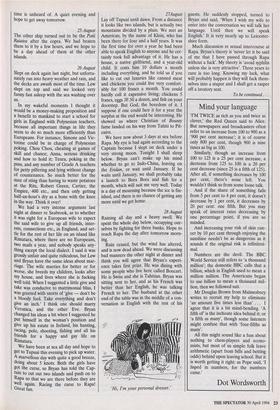Mind your language
Tis4 TWICE as rich as you and twice as clever,' the Red Queen said to Alice. But newspapers and broadcasters often refer to an increase from 100 to 900 as a '900 per cent increase'; it is of course only 800 per cent, though 900 is nine times as big as 100.
Similarly, though an increase from 100 to 125 is a 25 per cent increase, a decrease from 125 to 100 is a 20 per cent decrease (since 25 is a fifth of 125). After all, if something decreases by 100 per cent, there's none left. You wouldn't think so from some loose talk.
And if the share of something falls from 5 per cent to 4 per cent, it doesn't decrease by 1 per cent, it decreases by 20 per cent: one fifth. But you may speak of interest rates decreasing by one percentage point, if you are so minded.
And increasing your risk of skin can- cer by 10 per cent through enjoying the sunshine needn't be as dangerous as it sounds if the original risk is infinitesi- mal.
Numbers are the devil. The BBC World Service still refers to 'a thousand million'; the domestic BBC calls that a billion, which in English used to mean a million million. The Americans began to use billion to mean a thousand mil- lion, then we followed suit.
Mr Douglas Brown from Malmesbury writes to recruit my help to eliminate 'an amount five times less than' . . . I agree that it is a bit mind-bending. 'A fifth of is the inchoate idea behind it; or 'a fifth as many', though some listeners might confuse that with 'four-fifths as many'.
All this might sound like a fuss about nothing to chess-players and econo- mists, but most of us simple folk leave arithmetic (apart from bills and betting odds) behind upon leaving school. But it is worth getting it right: as Pope said, 'I lisped in numbers, for the numbers came.'
Dot Wordsworth


























































 Previous page
Previous page